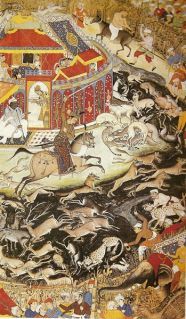My top three are:
1) Castles. I love learning about castles, who their architects were, the building materials, from where materials were acquired, who committed the actual labor that built them, their history of development to when they were no longer built.
{Sidebar: the last ones were built on Africa's slave coast guarding the ever-changing variety of Europeans who dominated the African slave trade to the New World, and built by, ta-dah! Italian architects after there was no longer work for their speciality in Europe due to gunpowder and cannon -- but lucky for them now there was a New World, that needed an endless supply of slave labor!}
But when on television or in the movies the castles portrayed are provided that romantic patina that comes with an ediface's age, particularly after it is no longer useful, i.e. our Romantic era's love of ruins in particular. But -- here are castles, in a story set in the era in which castles actually are built, and they're still Romantically ancient! And sometimes even ruinous -- Camelot anyone, perhaps the most ridiculous television series ever? One film I don't feel that way about though is El Cid, for some reason. What a castle movie that one is. But I just watched a 1979 movie, Lovespell, made from the Tristan and Isold romance (starring Richard Burton as King Mark -- and a splendid Kate Mulgrew as Isolt). All of it worked very well, except Burton's emoting as if on stage rather than on screen -- and Mark's ruinous castle, which is to provide us the audience a sense of verisimilitude. For me, it does just the opposite.
2) Arms, particularly swords and shields and mail and other armor. It matters not if the era is ancient, classical or medieval. The way the men move, whether merely cleaning, sparring or marching and battling, swords and shields look far too light. And that feather-light chainmail -- even when the era didn't have chainmail.... In fact they appear flimsy most of the time (The Adventures of the Young Merlin?). One exception to that is the 2005 Icelandic-Swedish film, Beowulf and Grendel. You know Beowulf and his men are heroes just from the obvious heft of their weapons, but that they can handle them easily.
3) Royalty running around anywhere without a retinue, or even an attendent to wipe their royal ass (unless after a battle when royally defeated and alone); royalty to whom attendants and homeowners no matter how noble, do not make obesience, particularly when the Royal enters their purview the first time. Well, I guess that makes four, not three, pet vexations!
So --
5) Westerns, in which the protagonist is an ex-confederate deadly killer who drifts aimlessly in hopes of discovering the Union army bastards who ta-dah! raped and killed his wife as well as his children (he always does cross their paths because, you know the continental U.S. and territories is just so very small and unpopulated and without cities and institutions) and burned down his grand plantation home, where all his ex-slave really want to stay and help him re-build because he was always so very very very good to them, and even had freed them long before the Wah was forced on them by the demned Yankees. I swan, the lady says, swooning on her sopha, fluttering her fan, Ah have learned from fiction, movies and television, there was not a single flower of Southern womanhood left unviolated by the Yankee beasts, and even hardly a slave to be found in the Glorious South befo da Wah!
Or -- as el V says: "Music told me the truth. Movies told me lies."

